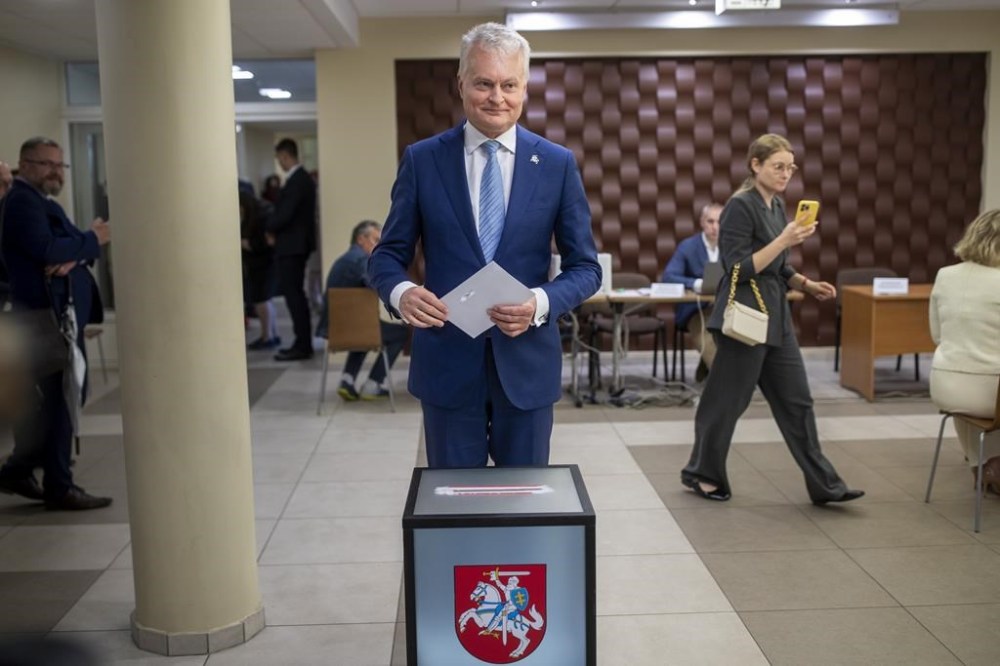Lithuanians return to the polls with incumbent president favored to win 2nd election round
Advertisement
Read this article for free:
or
Already have an account? Log in here »
To continue reading, please subscribe:
Monthly Digital Subscription
$0 for the first 4 weeks*
- Enjoy unlimited reading on winnipegfreepress.com
- Read the E-Edition, our digital replica newspaper
- Access News Break, our award-winning app
- Play interactive puzzles
*No charge for 4 weeks then price increases to the regular rate of $19.00 plus GST every four weeks. Offer available to new and qualified returning subscribers only. Cancel any time.
Monthly Digital Subscription
$4.75/week*
- Enjoy unlimited reading on winnipegfreepress.com
- Read the E-Edition, our digital replica newspaper
- Access News Break, our award-winning app
- Play interactive puzzles
*Billed as $19 plus GST every four weeks. Cancel any time.
To continue reading, please subscribe:
Add Free Press access to your Brandon Sun subscription for only an additional
$1 for the first 4 weeks*
*Your next subscription payment will increase by $1.00 and you will be charged $16.99 plus GST for four weeks. After four weeks, your payment will increase to $23.99 plus GST every four weeks.
Read unlimited articles for free today:
or
Already have an account? Log in here »
Hey there, time traveller!
This article was published 26/05/2024 (571 days ago), so information in it may no longer be current.
VILNIUS, Lithuania (AP) — Lithuanians return to the polls Sunday for the second round of the Baltic country’s presidential election as incumbent President Gitanas Nausėda seeks to hold off Prime Minister Ingrida Šimonytė and secure another five-year term.
The 60-year-old Nauseda, a moderate conservative, has been a strong backer of Ukraine, a position shared across most of the political spectrum. The popular Nauseda has been in office since 2009 and during that time Lithuania has also given refuge to many who have fled an authoritarian crackdown in neighboring Belarus and increased repression in Russia.
The president’s main tasks in NATO-member Lithuania’s political system are overseeing foreign and defense policy, along with acting as the supreme commander of the armed forces.

Given that Lithuania is strategically located on NATO’s eastern flank, the presidency of a relatively small nation is given added importance as tensions rise between Russia and the West over the war in Ukraine.
The election comes as Russian gains in Ukraine are fueling greater fears about Moscow’s intentions, particularly in the strategically important Baltic region.
After regaining its independence in 1991 from the Soviet Union, which occupied the southernmost Baltic country for five decades, Lithuania joined the European Union and NATO in 2004.
Both candidates have been outspoken critics of Moscow and of Minsk, a Russia ally.
Nausėda who is favored to win another five-year term, is a former banker who entered politics with his successful presidential run in 2019. He and Šimonytė won the first round but failed to muster the 50% of the votes needed to win the presidency outright. Nausėda won the first round on May 12 with 44% of the votes and Šimonytė nearly 20%.
Both Nausėda and Šimonytė, who became prime minister in 2020, also ran against each other in a presidential runoff in 2019, when Nausėda won with 66% of the votes.
Lithuania’s Central Electoral Commission is expected to announce the outcome of the election on Monday.

